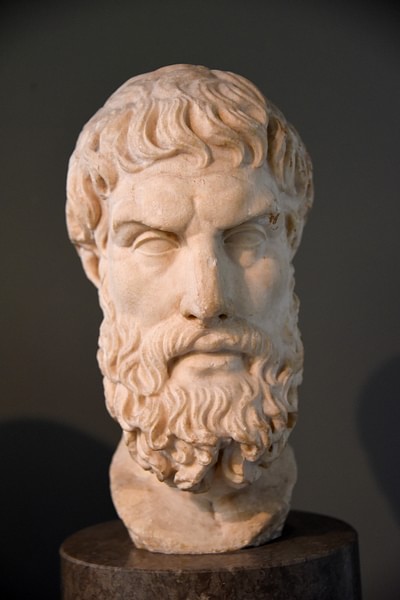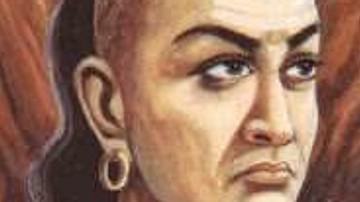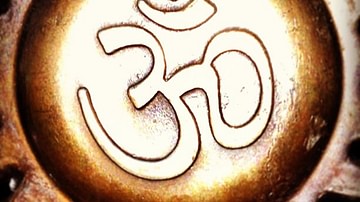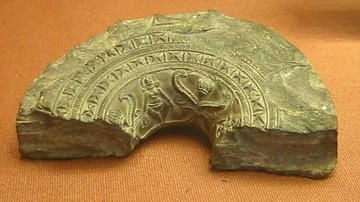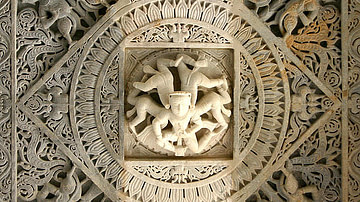
Charvaka (also given as Carvaka) was a philosophical school of thought, developed in India c. 600 BCE, stressing materialism as the means by which one understands and lives in the world. Materialism holds that perceivable matter is all that exists; concepts such as the soul and any other supernatural entities or planes of existence are simply inventions of imaginative people.
The meaning of the name is contested with some claiming it references the act of chewing since Charvaka emphasized the importance of enjoying life through eating and drinking while others maintain it is the name of the founder or that Charvaka was a disciple of the founder, a reformer named Brhaspati. The belief system is also known as Lokayata (“philosophy of the people”) and Brhaspatya after Brhaspati.
The Charvaka vision rejected all supernatural claims, all religious authority and scripture, the acceptance of inference and testimony in establishing truth, and any religious ritual or tradition. The essential tenets of the philosophy were:
- Direct perception as the only means of establishing and accepting any truth
- What cannot be perceived and understood by the senses does not exist
- All that exists are the observable elements of air, earth, fire, and water
- The ultimate good in life is pleasure; the only evil is pain
- Pursuing pleasure and avoiding pain is the sole purpose of human existence
- Religion is an invention of the strong and clever who prey on the weak
It should be noted, however, that, while the above are accepted as the tenets of Charvaka, no original Charvakan texts have yet been found; all that is known of the belief system comes from later Hindu, Jain, and Buddhist works which were hostile toward the philosophy and recorded its beliefs in refuting them. Charvaka is thought to have been developed by Brhaspati (not to be confused with the great sage of light Brhaspati of Dharma Shastra fame) in response to what he perceived as the superstitious nonsense people were fooled into accepting as irrefutable truth.
Brhaspati's disciple, Charvaka, is thought by some to have developed his original vision. It is equally possible that Charvaka was its founder and Brhaspati the disciple and also possible that neither is true. The Brhaspati Sutra, said to be the central text of Charvaka, was lost or destroyed and any claims made regarding the philosophy should be viewed critically; including any made in this present article. Although it seems to have exerted considerable influence in its time, especially in developing what would be known today as the scientific method, it never took root and died out by the 12th century CE.
The concepts expressed, however, not only contributed to the intellectual climate which allowed for the development of scientific thought but also anticipate the atheism of Critias of Athens (l. c. 460-403 BCE), the hedonistic school of Aristippus Cyrene (l. c. 435-356 BCE) and, most famously, the work of Epicurus (l. 341-270 BCE) and his development of “enlightened hedonism” at his school in Athens. These thinkers, and those who followed them, would influence the empiricist and utilitarian philosophies of the 19th century CE and the existential movement of the 20th century CE. Charvaka, therefore, was a belief system far ahead of its time even if it did not directly influence these later systems.
The Vedic Period & Charvaka
Charvaka was a response to the accepted religious vision of India at the time based on the Vedas. The Vedas are the principal religious texts which inform Hinduism (known to adherents as Sanatan Dharma, “Eternal Order” or “Eternal Path”). The word Veda means “knowledge” and the four Vedas – Rig Veda, Sama Veda, Yajur Veda, and Atharva Veda – are believed to relate the essential knowledge one needs to understand the Eternal Order of the universe and one's place in the world.
These texts are considered Shruti (“what is heard”) by orthodox Hindus in that they are believed to have been “spoken” by the Universe through vibrations at some point in the distant past and “heard” by sages, in meditative states, sometime before c. 1500 BCE. These sages preserved the messages in oral form until they were written down during the Vedic Period (c. 1500 - c. 500 BCE) with other texts (including the Upanishads) which commented on and clarified them.
The vision of the Vedas gave rise to the religious/philosophical movement known as Brahmanism which maintained the world operated according to certain set rules, which were observable and demonstrable, and the existence of these rules, known as rita (“order”) argued for a rule-maker. This rule-maker was determined to be an incomprehensibly great being who had both created and was the Universe, and they called this Brahman.
Brahman could not be grasped by individual mortal minds, however, and so it was further determined that each human being carried a spark of this divine being within them known as the Atman and the purpose of life was to realize union of the Atman with Brahman. One did so by performing one's duty (dharma) in accordance with right action (karma) to achieve liberation (moksha) and freedom from the cycle of rebirth and death. People could either embrace the pursuit of self-actualization and union (through which they would become better versions of themselves) or reject the divine truth and suffer accordingly in this life and each which would follow until they finally embraced the path of Divine Love and order.
The Vedas were chanted by the priestly class in Sanskrit, the language the works had been “heard” and composed in. The people who heard these chants did not understand Sanskrit and had to take the priests' word for these texts being directly from God. Religious and philosophical schools who accepted the Vedas as a spiritual authority were known as astika (“there exists”) and so also accepted the existence of the Atman, Brahman, and the rest of the Vedic vision. Those who did not accept any of these were known as nastika (“there does not exist”). Nastika schools of thought included Jainism, Buddhism, and Charvaka.
Based on comments, criticisms, and remarks from later texts, Brhaspati thought it absurd that people would accept the word of the priests that these incomprehensible texts were the word of God and, more so, that they would consistently follow the rules, rituals, penances, and proscriptions the priests set down when it seemed clear this was all just a clever means by which the upper-class priests could live well at the expense of the lower class who had been tricked into accepting their fables as truths.
There is no way to actually know what motivated Brhaspati, nor even what his initial actions were in defiance of orthodox belief, but it seems that, at some point, he either preached a new vision or composed a text which expressed his belief that the purpose of life was to enjoy it to the greatest extent without fear of punishment in this life or any other because the life one was living clearly had no divine governor and one would not be granted another.
Beliefs & Arguments
Charvaka's primary objection to the Vedic vision was that it could not be proven; it had to be accepted on faith and that faith was encouraged by a priestly class which was clearly benefiting from it at the expense of others. Sacrifices, gifts, and penitential gestures enriched the priests while contributing to the poverty of the lower class. This enrichment was made possible by an unprovable claim that the priests knew the Ultimate Truth which, if accepted, guaranteed one a more prosperous, fulfilling existence in this life and a blissful reunion with God after death. The fear of what lay beyond death, the prospect of endless incarnations of struggle, life after life after life, encouraged people to accept the priests' claims in the hope that they were true; but, Charvaka claimed, they were not true because they lacked any substantive proof.
This objection led to the foundational Charvakan belief that only direct perception of anything, whatsoever, could establish truth and, further, that which could not be perceived or recognized by the senses could not possibly exist. As noted, there were other nastika schools of thought, Jainism and Buddhism, which developed alongside Charvaka which also rejected the Vedic vision but Charvaka differed from these significantly, as scholar John M. Koller notes:
Charvaka is the only completely materialistic system; all the others accept ways of spiritual life. Jainism, for example, attempts to show the way out of karmic bondage. It emphasizes a life of nonhurting that culminates in final release from bondage through meditative self-realization. Buddhism presents an analysis of the nature and causes of human suffering and presents the eightfold path as a cure for suffering. (7)
Charvaka, conversely, claims that suffering is simply the privation of pleasure and the cure for this is the pursuit of sensual enjoyment. There is no duty one owes to anyone or anything except one's self and no “karmic debt” one can accrue because there is no God to keep any kind of tally of one's deeds or misdeeds. What one sees in life is all there is to life, Charvaka claims, and religious precepts, rules, and rituals are simply a means by which the strong and clever enable their own pursuit of pleasure.
Charvaka rejected religious cosmology on the grounds that there was simply no need to speculate on the creation of the universe. Such pursuits were a waste of time because there was no way one could ever know how the universe came to be. One could conclude, through observation, that nature regenerated and reproduced itself according to natural laws. It was therefore logical to conclude that, however the cosmos came into being, it had developed according to this same sort of law. Knowing how the universe began could not possibly enrich one's life in any way and so cosmology could be safely discarded.
Epistemology was considered equally useless because one recognized truth through perception and there was no reason to investigate how one knew that one was holding a large stone when it was obvious one was holding a large stone. They therefore rejected the religious pramanas (“sources or proofs of knowledge”), especially inference and personal testimony. Inference could not be relied upon for establishing truth because, unlike direct perception, one's inference could be wrong.
The example most commonly used in discussing Charvaka's problem with inference is the presence of smoke as proof of fire. One sees smoke coming from a building's window and infers that there must be fire in that room, but this is not necessarily so; someone in that room could be cleaning out a fireplace or stove, stirring up soot which blows out the window in such a way that it appears to an observer as smoke. Testimony, therefore, is equally unreliable since someone seeing what they thought was smoke from a window would be likely to report that the building was on fire when, actually, the smoke they claimed to have seen was not smoke at all.
Ethical systems were also rejected because they were defined by so-called “moral laws” which were simply another set of fables created by the priests to control others and enrich themselves. What was good in life was what felt good to the individual and what was bad was what felt bad. Ethical systems only complicated this very simple truth, denied people pleasure, burdened them with guilt, and did nothing else except contribute to the control of the many by the few. Anticipating the work of Jeremy Bentham (l. 1748-1832 CE) and John Stuart Mill (l. 1806-1873 CE) by centuries, Charvaka would say that “right behavior” is that which produces the greatest good for the greatest number of people and “wrong behavior” is that which causes the greatest amount of pain.
The concept of “good” here would be understood as “pleasure”. Evil, as the opposite of Good, was recognized as simply the absence of pleasure. The inability to pursue one's individual pleasure encouraged one to engage in acts to remove obstacles to that pleasure and this is when people initiated or participated in acts which others condemned as illegal and punished the perpetrators for. Those who administered the punishments, however, were no more virtuous than those who had committed the crime; the authorities were simply trying to maintain their own level of pleasure at the expense of those who had been denied.
Similarity to Later Systems
These same concepts were developed, most likely independently, in ancient Greece and elsewhere. Although the Athenian politician Critias never established a formal school, his extant work echoes the same vision as Brhaspati's. Critias wrote that religion is nothing more than a means whereby the strong controlled the weak, enriching themselves by maintaining laws which operated for their benefit. The philosophy of Aristippus of Cyrene is nearly identical to Charvaka in that he believed the noblest goal one could dedicate one's self to in life was the pursuit of pleasure.
Aristippus believed in living for the moment and enjoying one's self as much as one could. His philosophy is often compared to that of the Chinese hedonist philosopher Yang Zhu (l. 440-360 BCE) who also believed religion was an artificial construct to control people and worrying about what defined a “right action” and a “wrong action” was a waste of time when one could be enjoying one's self doing whatever one wanted.
The best-known hedonist, of course, is Epicurus who also believed that the pursuit of pleasure should be one's highest goal. Epicurus' philosophy, however, was actually far from the kind of hedonism championed by Charvaka or by Aristippus or Yang Zhu. To Epicurus, the pursuit of pleasure meant enjoying fully what one had without worrying about what one did not. Pleasure produced happiness only as long as it could be enjoyed without stress or concern which meant one should observe moderation in all things in order to live as long as possible in optimal health to enjoy as much as one could.
Whether Charvaka influenced any of these later writers is unknown but it is interesting to note the Charvakan concepts expressed in other cultures. The Greek writers would lay the groundwork for later writers such as the Scottish empiricist David Hume (l. 1711-1776 CE) among whose claims is that, if one were never told that God exists, one would find nothing in the world to suggest such an entity. The utilitarian philosophy developed by John Stuart Mill bears remarkable similarities to Charvaka and, with some differences, so do the works of the existentialists, notably Jean-Paul Sartre (l. 1905-1980 CE) and his followers.
Conclusion
These later writers and philosophical systems were not received well by the establishment when they first appeared and, certainly, not by organized religion. The religious response in ancient India to Charvaka followed this same paradigm. Charvaka's rejection of religion and insistence on the pursuit of pleasure undermined the authority of the priests as well as the upper class but, just as importantly, is said to have disturbed the status quo by denying people hope of an ultimate meaning in life and security after death.
Charvaka's claim that there was no afterlife promising a final reward for the worthy could hardly have been welcome news. Brhaspati's audience, as all humans, recognized death as a certainty and had been taught that good behavior led to a blissful afterlife while those who had behaved badly would be punished. Charvaka promised nothing of the kind; there was only one end for the virtuous and the wicked and nothing one did in life could alter the fact that one's path led directly to certain extinction.
Although it was referred to as Lokayata – “the people's philosophy” – there is no evidence it was ever widely adopted. Scholar P. Ram Manohar notes that it “never became established as a predominant school of thought” (Paranjape, 5). It seems this term was coined to mean “popular” as in lacking intellectual weight (as per the phrase “popular opinion” as opposed to one more informed) and, finally, as a kind of synonym for materialism which denied the value of higher pursuits in life.
Charvaka, however, was far from “uninformed” in that it inspired the development of the scientific method in India by encouraging direct observation of phenomena, a hypothesis created to explain said phenomena, and conclusions based on empirical corroboration of that hypothesis. Manohar notes that Charvaka “exerted a powerful influence and helped to achieve a balance between the spiritual and material worldviews” (Paranjape, 5). Even though Brhaspati's system never replaced orthodoxy, it certainly influenced the intellectual landscape of India.
Maladies such as sickness and injury or the welcome experiences of prosperity and unexpected good fortune came to be understood as naturally occurring instead of divine acts to punish or reward behavior. The Dharma Shastras and works like the Arthashastra were made possible because of the recognition of the value of Charvakan materialism in modified form. Even so, Charvaka was eventually outdistanced by Hindu, Jain, and Buddhist systems which offered a more hopeful vision of the afterlife and meaning in one's daily existence. Charvaka's message, however, would change the way people saw the world even if they could not fully embrace its vision of a life lived fully and solely according to one's own personal values without expectation of reward or fear of punishment.



